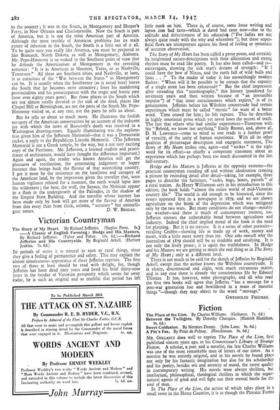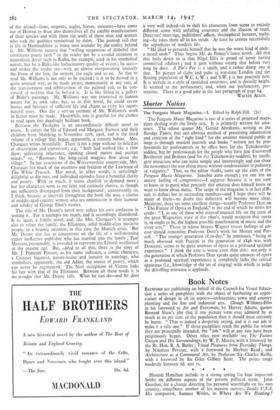Fiction
Sweet Confusion. By Norman Denny. (John Lane. 9s. 6d.)
A Pin's Fee. By Peter de Polnay. (Hutchinson. 9s. .6d.) Mn. GomaNcz does well to reprint The Place of the Lion, first published sixteen years ago, in his Connoisseur's Library of Strange Fiction. A scholar, a poet and a novelist, the late Charles Williams was one of the most remarkable men of letters of our times. As a novelist he was entirely, original, and in his novels he found place not only for his fantastic imagination but also for his scholarship and his poetry, besides wit and serenity of mood, the rarest quality in contemporary writing. His novels were always thrillers, but intellectual, philosophical, theological thrillers in which the super- natural agents of good and evil fight out their eternal battle for the soul of man.
In The Place of the Lion, the action of which takes place in a small town in the Home Counties, it is as though the Platonic Forms
of the animal—lions, serpents, eagles, horses, unicorns—have come out of Heaven to draw into themselves all the earthly manifestations of their species and with them the souls of those men and women who seek the qualities symbolised by them. The painted veil that is life in Hertfordshire is being torn asunder by the reality behind it. Mr. Williams secures that "willing suspension of disbelief that constitutes poetic faith" in the reader not by a careful attention to naturalistic detail such as Kafka, for example, used in his symbolical novels, but by a Blake-like hallucinatory quality of vision ; he sees— and makes the reader see—with an almost overpowering intensity the Form of the lion, the serpent, the eagle and so on. So that to read Mr. Williams is not only to be excited ; it is to be moved in a quite unusual way, to be made aware, momentarily at any rate, of the transitoriness and arbitrariness of the painted veil, to be con- vinced of realities that lie behind it. It is like living in a gallery of Blake's paintings. Mr. Williams was not interested in human nature for its own sake, but, as in this novel, he could create heroes and heroines of sufficient life and charm to carry his super- natural story. One day a serious estimate of Mr. Williams's work in fiction must be made. Meanwhile, one,is grateful for the Chatice to read again this dazzlingly brilliant book.
Between the Twilights is an extraordinarily difficult novel to assess. It covers the life of Edward and Margaret Furness and their children from Mafeking to November rith, 1918, and is the third volume of a trilogy that began, apparently, a century before. Mrs. Charques writes beautifully. There is not a page without its felicities of observation and expression ; e.g., "Seth had worked like a slow thaw, unfreezing reluctance, opening closed purses and puritan minds," or, "Rumours like long-tailed magpies flew about the village." In her evocations of the Worcestershire countryside, Mrs. Charques has much of the exactness and lyritism of the Lawrence of The White Peacock. Her novel, in other words, is unfailingly delightful to dip into, and individual episodes have a beautiful clarity and poetry. With so much, it seems churlish to demand more ; but her characters seem to me faint and curiously elusive, as though not sufficiently disengaged from their background ; unnecessarily so, I think, because at intervals throughout the book she uses a chorus of middle-aged country women who are reminiscent in their humour and solidity of George Eliot's rustics.
The title of Mr. Denny's novel may reflect his own confusion in writing it. For it attempts too much, and is accordingly disordered. It is, again, a family novel, and, like Mrs. Charques's it attempts also to relate the family, the Ellistones, solid middle-class business people, to a historic situation, in this case the Munich crisis. But Mr. Denny also has to concentrate on the life of a well-meaning rather ineffective publisher who has married into the family ; Paul Merrion, presumably, is intended to represent the Liberal intellectual in the present age. But, added to all this, there is the story of Mr. J. Pomeroy Pinsent, as his name indicates, a comic character, a Cockney bigamist, nature-healer and lecturer in astrology, who symbolises, apparently, the old Adam, the source of poetry, which can never be regimented. The Nazi occupation of Vienna links his fate with that of the Ellistones. Between all these stools it is no wonder that Mr. Denny falls. What he can do—and he .does it very well indeed—is to shift his characters from scene to entirely different scene with unfailing assurance and the illusion of truth. Directors' meetings, publishers' offices, theosophical lectures, yacht- ing—he takes them all in his stride. At least he creates successfully the superficies of modern life.
"He liked to persuade himself that he was the worst kind of snob: a moral snob." Thus begins Mr. de Polnay's latest novel. All that this boils down to is that Nigel Ellis is proud of never having committed adultery ; and it goes without saying that before very long he does. A Pin's Fee i a squib, and a rather damp one at that. Its picture of clubs and pubs in war-time London and tht. floating population of W.C. t, W.i and S.W. 3 is not precisely new. It is written in a style of tarnished smartness, and is drearily bright. It seemed to me perfunctory, and, when not perfunctory, pre- tentious. There is a good joke in the last paragraph of page 64.
WALTER ALLEN.



































 Previous page
Previous page